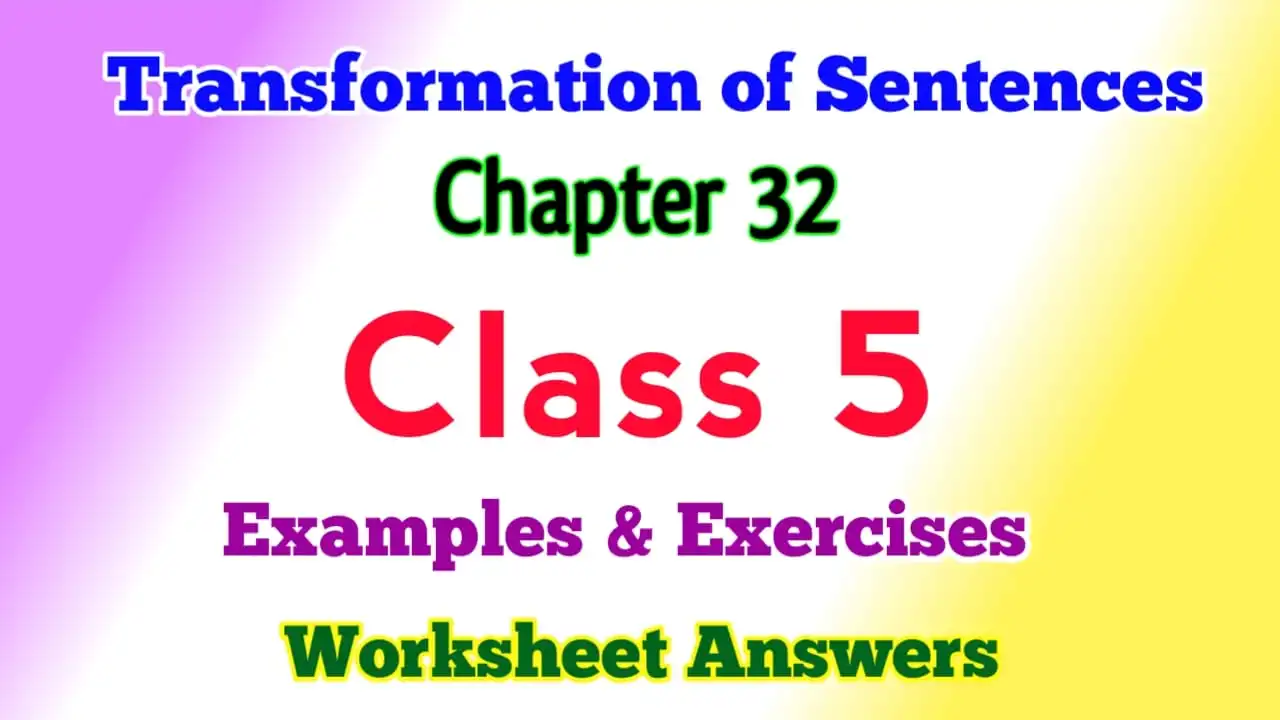Transformation of Sentences Class 5 English Grammar has been prepared for learning English Grammar of Class 5 under CBSE, ICSE, and Other State boards as Lesson No 32. Class 5 students in their English Grammar learning process will get help from the Transformation of Sentences Class 5 English Grammar to achieve better speaking and writing skills in English.
English Grammar eBook Class 5
This Lesson 32, Transformation of Sentences Class 5 English Grammar contains –
- About transforming sentences,
- From Exclamatory to Declarative,
- From Declarative to Interrogative,
- From Imperative to Interrogative,
- From Affirmative to Negative
- Tag questions
- with a practice worksheet.
About Transformation of Sentences Class 5 English Grammar
A sentence can be changed from one kind to another without changing its meaning.
From Exclamatory to Declarative
An exclamatory sentence can be changed into a declarative sentence and vice versa.
Example:
- What an amazing scenery (it is)! (exclamatory)
- It is an amazing scenery. (declarative)
- How beautiful she is! (exclamatory)
- She is very beautiful. (declarative)]
From Declarative to Interrogative
Declarative sentences can be changed into interrogative sentences and vice versa.
♦ A declarative sentence can be changed into an interrogative sentence by putting the verb before the subject.
Example:
- She is very kind. (declarative)
- Isn’t she very kind? (interrogative)
Note: In order not to change the meaning, use “Isn’t”, “Aren’t”, “Hasn’t” and “Won’t”.
Example:
- I am in Class V. (declarative)
- Aren’t I in Class V? (interrogative)
♦ When a declarative sentence has two verbs-one helping and one main, it can be changed into an interrogative sentence by putting the subject between the two verbs.
Example:
- She has finished her homework. (declarative)
- Hasn’t she finished her homework? (interrogative)
- You are going to the fair. (declarative)
- Aren’t you going to the fair? (interrogative)
- I will meet you at the mall. (declarative)
- Won’t I meet you at the mall? (interrogative)
When a declarative sentence contains the adverb never, it becomes ever in the interrogative sentence.
Example:
- I never asked you to do it. (declarative)
- Did I ever ask you to do it? (interrogative)
• When a declarative sentence contains the adverb no, it becomes any in the interrogative sentence.
Example:
- There is no fun in doing that. (declarative)
- Is there any fun in doing that? (interrogative)
People also read
Worksheet 1:Transformation of Sentences Class 5 English Grammar
Change the following declarative sentences into interrogative sentences.
1. Sheila is my best friend.
2. Rahul and Amit are going to the school fest.
3. My brother is in Class XII.
4. He has finished practising his music.
5. Fiona has stopped going out in this heat.
6. She never goes out when it is raining.
7. She is no fun when she is in a grumpy mood.
8. Diane is no fool that she will fall for your trick.
From Imperative to Interrogative
◆ An imperative sentence can be changed into an interrogative sentence and vice versa.
Example:
- Stop talking. (imperative)
- Will you stop talking? (interrogative)
- Please get me a glass of water. (imperative)
- Will you get me a glass of water, please? (interrogative)
Worksheet 2: Transformation of Sentences Class 5 English Grammar
B. Change the sentences as instructed.
1. Come here. (Change to interrogative.)
Ans: Will you come here?
2. It is a great victory. (Change to interrogative.)
3. Stop talking. (Change to interrogative.) will
4. Will you get away from the pool? (Change to imperative.)
5. Shut the door. (Change to interrogative.)
6. Do not disturb me. (Change to interrogative.)
7. What a beautiful view! (Change to declarative.)
8. Has she finished her work? (Change to declarative.)
9. Is she your friend? (Change to declarative.)
From Affirmative to Negative
* An affirmative sentence can be changed into a negative sentence with a change in its meaning.
Example:
- My sister lives in Goa. (affirmative)
- My sister does not live in Goa. (negative)
- I have many friends. (affirmative)
- I have no friends. (negative)
* An affirmative sentence can be changed into a negative sentence without changing its meaning.
Example:
using not + prefixes
Affirmative: He is honest.
Negative: He is not dishonest.
Affirmative: She is comfortable.
Negative: She is not uncomfortable.
for words with suffixes
Affirmative: It was thoughtless of you to say so.
Negative: It was not thoughtful of you to say so.
Affirmative: She is clueless about how to do the work.
Negative: She has no clue about how to do the work.
using not + opposite words
Affirmative: He is a good boy.
Negative: He is not a bad boy.
Affirmative: This dress is cheap.
Negative: This dress is not expensive.
using no one, nothing, nowhere
Affirmative: Everyone found the play interesting.
Negative: No one found the play uninteresting.
Affirmative: This is the only thing I want.
Negative: I want nothing but this thing.
changing always to never
Affirmative: There is always scope for you to make amends.
Negative: It is never too late for you to make amends.
changing too to so…that, Everyone to None, to to so… that, only to nothing, always to never.
Affirmative: The crash victim was too weak to walk.
Negative: The crash victim was so weak that he could not walk.
Worksheet 3: Transformation of Sentences Class 5 English Grammar
C. Change these sentences into negative sentences without changing their meaning.
1. He is honest.
2. Iron is a heavy metal.
3. He is always on time.
4. Everyone liked the lecture.
5. I shall never forget you.
6. He is sure of his success.
7. He refused the order.
8. Everybody is present.
9. Everyone found the film interesting,
10. The water is too cold for me to drink.
11. Everyone will agree that he is an intelligent person.
12. I am unhappy with the way things are progressing.
Tag questions
♦ A declarative sentence can also be changed into an interrogative sentence by adding a short question at the end.
Example:
- She is beautiful, isn’t she?
These short questions that we put at the end of sentences are called tag questions. Tag questions contain a helping verb and a subject pronoun.
Usually, if the sentence is positive, the question tag is negative.
Positive sentence: I am a student,
Negative tag: aren’t I?
Positive sentence: You are a student,
Negative tag: aren’t you?
Positive sentence: She is a student,
Negative tag: isn’t she?
Positive sentence: She was coming,
Negative tag: wasn’t she?
Positive sentence: He lives (does live) in Paris
Negative tag: doesn’t he?
Positive sentence: They live (do live) in Paris,
Negative tag: don’t they?
Positive sentence: He was happy,
Negative tag: wasn’t he?
Positive sentence: They were happy,
Negative tag: weren’t they?
Positive sentence: He went (did go) to the party last night,
Negative tag: didn’t he?
Positive sentence: They were waiting for us,
Negative tag: weren’t they?
Positive sentence: They have been to Paris,
Negative tag: haven’t they?
Positive sentence: He had gone home early,
Negative tag: hadn’t he?
Positive sentence: She will arrive early,
Negative tag: won’t she?
Positive sentence: He can help,
Negative tag: can’t he?
Positive sentence: He must come today,
Negative tag: mustn’t he?
Usually, if the sentence is negative, the question tag is positive.
Negative sentence: I am not a student,
Positive tag: am I?
Negative sentence: You aren’t a student,
Positive tag: are you?
Negative sentence: She isn’t a student,
Positive tag: is she?
Negative sentence: She wasn’t coming,
Positive tag: was she?
Negative sentence: He doesn’t live in Paris,
Positive tag: does he?
Negative sentence: They don’t live in Pari
Positive tag: do they?
Negative sentence: He wasn’t happy.
Positive tag: was he?
Negative sentence: They weren’t happy.
Positive tag: were they?
Negative sentence: He didn’t go to the party last night,
Positive tag: did he?
Negative sentence: They weren’t waiting for us,
Positive tag: were they?
Negative sentence: They haven’t been to Paris,
Positive tag: have they?
Negative sentence: He hadn’t gone home earl
Positive tag: had he?
Negative sentence: She won’t arrive early,
Positive tag: will she?
If a sentence contains negative words like never, seldom, or hardly ever, we
generally use positive question tags.
Example:
- She never comes late, does she?
- We don’t keep our country clean, do we?
- It hardly ever rains in a desert, does it?
If the main subject is everybody, everyone, somebody, someone, nobody, or no one, we use the subject they in the question tag.
Example:
- Everybody loves her, don’t they?
- No one objected, did they?
- Everyone agreed, didn’t they?
Worksheet 4: Transformation of Sentences Class 5 English Grammar
D. Complete the statements by adding suitable question tags.
1. He can drive, ____________
2. You were late, ____________
3. He invited her, ____________
4. You will help us, ____________
5. This won’t work, ____________
6. You don’t like her, ____________
7. It isn’t snowing, ____________ t
8. Saina isn’t a tennis player, ____________
9. You will tell me if she calls, ____________
10. I went to the party that evening, ____________
11. The weather is bad, ____________
12. You didn’t visit the museum, ____________
15. You aren’t his brother, ____________
14. I can climb this hill, ____________
15. He didn’t try his best,____________
Class 5 English Grammar: All Topics & Chapters????:
Chapter 1. Parts of speech
Chapter 2. The sentence and Types
Chapter 3. Subject and Predicate
Chapter 4. Nouns and their Types
Chapter 5. Noun and Number
Chapter 6. Noun and Gender
Chapter 7. Articles
Chapter 8. Pronouns and their Classifications
Chapter 9. Verbs and Types of Verbs
Chapter 10. Regular Verbs Irregular Verbs List
Chapter 11. Subject and Verb Agreement
Chapter 12. Simple Present Tense
Chapter 13. Present Continuous Tense
Chapter 14. Present Perfect Tense
Chapter 15. Present Perfect Continuous Tense
Chapter 16. Simple Past Tense
Chapter 17. Past Continuous Tense
Chapter 18. Past Perfect Tense
Chapter 19. Past Perfect Continuous Tense
Chapter 20. Simple Future Tense
Chapter 21. Future Continuous Tense
Chapter 22. Future Perfect Tense
Chapter 23. Future Perfect Continuous Tense
Chapter 24. Tense Exercises
Chapter 25. Modal Verbs
Chapter 26. Adjectives and their Types
Chapter 27. Degree of Adjectives
Chapter 28. Adverbs and Comparison
Chapter 29. Prepositions and their Uses
Chapter 30. Conjunctions
Chapter 31. Direct and Indirect Speech
Chapter 32. Transformation of Sentences
Chapter 33. Punctuation







